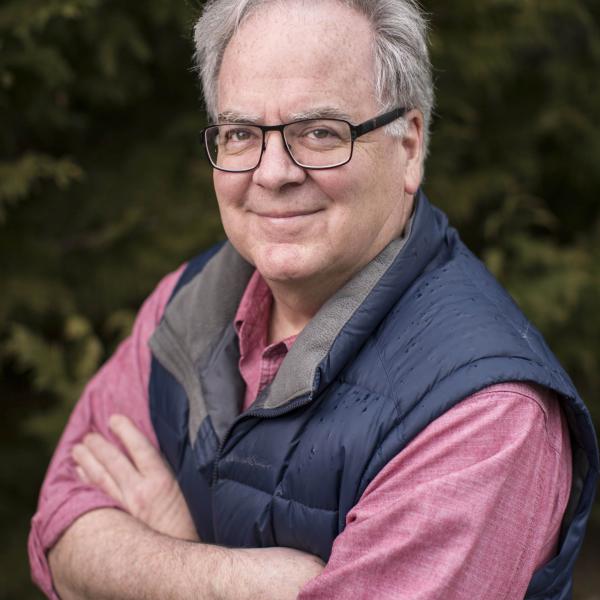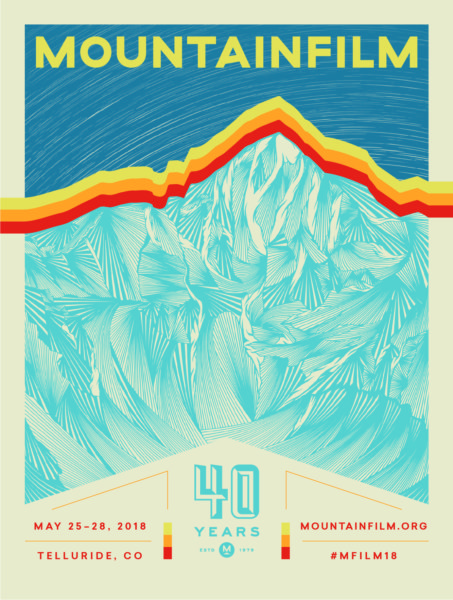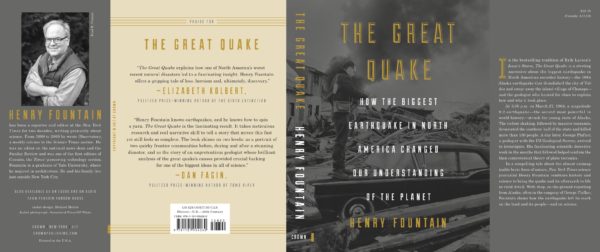
01 May Mountainfilm: Henry Fountain To Lead Symposium
Mountainfilm marks the kick-off of the summer festival season in Telluride. The event takes place over Memorial Weekend, Friday, May 25 – Monday, May 28, 2018. Go here for passes/tickets, which are selling out very fast.
Telluride author Susan Dalton captures Mountainfilm‘s best memories in “Mountainfilm: 40 Years.” The beautiful coffee table book costs just $49 (tax included) and can be pre-ordered now here.
Henry Fountain of the New York Times is a featured guest presenter. He will chair Mountainfilm’s Symposium on Migration and also sign his latest book, “The Great Quake.” Please scroll down to listen to Fountain’s podcast and to learn more about the other presenters on the panel, which include Governor Jay Inslee of Washington State.

In a recent story for The New York Times, Henry Fountain talked about how, “With an increase in extreme weather expected in the years to come, forests could be changed permanently as the world continues to warm.”
In another, he reported: “By studying the natural effects of a large volcanic eruption, scientists could learn about how we might deliberately cool the planet in the future.”
And this: “With climate change warming Arctic air, researchers say, cold snaps are getting warmer…”
Henry Fountain is a longtime New York Times editor and reporter who has written about science for two decades. His recent focus is on the innovations that will be needed to fight climate change.
Fountain also writes about other science-related subjects and natural and human-caused disasters, including earthquakes, hurricanes, mudslides, nuclear accidents and more, such as the infamous bridge collapse in Florida.
From 1999 to 2009 Fountain’s “Observatory” was a weekly column in the “Science Times” section of his paper. He was also an editor on the national news desk and the Sunday Review and one of the first editors of “Circuits,” the Times‘ pioneering technology section.
Fountain is also author of “The Great Quake,” a new book about the 1964 Alaskan earthquake described as a compelling take on the unimaginable brute force of nature.

“The Great Quake” is rich with such revelations; and I felt grateful, even giddy, as I read them. Fountain’s book is like a gift box: Open the lid to peek at the treasures of the Earth. I could geek out on such details for a month and never miss mentions of humanity…,” wrote The New York Times.
“Henry Fountain’s ‘The Great Quake’ is dedicated to the five terrifyingly convulsive minutes around dinnertime on March 27, 1964, when the forces of geological upheaval, normally beneath our threshold of perception, violently obtruded into human time, reconfiguring not only the landscape of south central Alaska but our understanding of earthquakes and the risk posed today by the Big One and Really Big One…,” wrote The Los Angeles Times.
(And for the record, the Alaskan earthquake registered 9.2 on the Richter Scale OR many times stronger than the biggest quake predicted along the San Andreas fault – making it the most forceful tremor ever recorded in North America.)
Henry Fountain is a first-time guest presenter at the 40th anniversary of Mountainfilm, (May 25 – May 28, 2018), where he will be signing “The Great Quake” and hosting the weekend’s opening event, the Moving Mountains Symposium on Friday, May 25, which focuses on migration.

Henry Fountain, courtesy, The New York Times.
As someone who has reported extensively on climate change, Fountain is a logical choice to lead the talk that will continue in different ways throughout the weekend – because climate change is a if not the leading cause of mass migration in humans and animals alike.
According to the International Organization for Migration (IOM):
“Environmental factors have long had an impact on global migration flows, as people have historically left places with harsh or deteriorating conditions. However, the scale of such flows, both internal and cross-border, is expected to rise as a result of accelerated climate change, with unprecedented impacts on lives and livelihoods. Such migration can have positive and negative effects on both the local coping capacity and the environment in areas from which these migrants originate, as well as in their temporary or permanent destinations…Migration can be a coping mechanism and survival strategy for those who move. At the same time, migration, and mass migration in particular, can also have significant environmental repercussions for areas of origin, areas of destination, and the migratory routes in between and contribute to further environmental degradation…”
Findings about climate change set back the clock on the earliest known arrivals of humans in Europe by tens of thousands of years and also provide important clues as to what drew early humans out of Africa and into Eurasia and beyond.
In a study published in Nature magazine, researchers reported that dramatic climate fluctuations created favorable environmental conditions that triggered periodic waves of human migration out of Africa every 20,000 years or so – beginning just over 100,000 years ago.
Further the study quoted in sapiens.org finds that “humans traveled out of Africa in four waves across the Arabian Peninsula and the Levant region (the eastern Mediterranean). These waves occurred from 106,000 to 94,000 years ago, 89,000 to 73,000 years ago, 59,000 to 47,000 years ago, and 45,000 to 29,000 years ago—results that apparently align well with a growing body of archaeological and fossil data. The wave that occurred approximately 50,000 years ago is likely the one that led to the population of the rest of the world.”
According to the UN Food and Agriculture Organization, between 2008 and 2015, an average of 26 million people were displaced annually by climate or weather-related disasters.
Fast forwarding to the present, per the World Bank, global climate change and mass migration could well be the new normal, with some sources claiming climate change could cause 140 million in three densely populated, developing regions – subSaharan Africa, South Asia, Latin American – to be displaced by 2050 due to drought, hurricanes, crop failure, sea level rise, floods, and increased storms.
Other estimates up the ante to 200 million.
Due to the growing frequency of those natural disasters, the scale of migration could grow even further and happen faster.
In other words, rapid climate change will environmentally stress lots of countries, developing and otherwise – unless.
The World Bank report also found that swift action on the part of governments to limit greenhouse gas emissions and develop plans to help populations in vulnerable areas could reduce the number of migrants by about 100 million.
Can climate migration be “solved” or is it really the new normal?
Can governments be compelled to take decisive action to reduce global greenhouse emissions, so that more people can remain safely in their homes and communities?
And can governments be made to to revisit current strategies dealing with immigrants who, in a real sense, are victims of the Industrial Revolution and its corollary, carbon emissions?
Or will change largely have to come from grassroots initiatives, from the ground up, not the top down as Paul Hawken believes?
Mountainfilm will address these and other related, very important questions over Memorial Weekend.
In addition to Fountain, Mountainfilm’s 2018 symposium lineup includes:
Immigrant leadership advocate, speaker and writer Sayu Bhojwani works to make American democracy more inclusive.
Bhojwani is founder of the New American Leaders Project, which fosters leaders in immigrant communities and helps them run for public office. As New York City’s first Commissioner of Immigrant Affairs, she worked to pass legislation to protect the rights of workers and increase access to translation and interpretation services. Bhojwani is the founder of South Asian Youth Action (SAYA) and holds a doctorate in politics and education from Columbia University.
Craig Childs is a writer of the American Southwest who focuses on natural sciences, archaeology, and remarkable journeys into the wilderness. His work has appeared in The New York Times, Los Angeles Times, Men’s Journal, Outside, Orion, and High Country News, and he has authored more than a dozen books. His newest book, “Atlas of a Lost World: Travels in Ice Age America,” follows the first human migrations into the New World during the Ice Age. The Arizona native currently lives in Norwood, Colorado.
Elizabeth Ferris has spent her career working in the fields of refugees, migration and humanitarian issues. She is a research professor with the Institute for the Study of International Migration at Georgetown University’s School of Foreign Service and a nonresident senior fellow in Foreign Policy at the Brookings Institution. In 2016, Ferris served as a senior advisor to the UN General Assembly’s Summit for Refugees and Migrants in New York. She is also the author of several books, including “Consequences of Chaos: Syria’s Humanitarian Crisis” and the “Failure to Protect.”
An expert of environmental geopolitics and migration policy, Francois Germenne is a research fellow in political science and associate expert with the Centre de Recherches Internationales. His work deals mostly with populations displaced by environmental changes and the policies of adaptation to climate change. Germenne’s field studies have taken place in post-Katrina New Orleans, Tuvalu, the Maldives and Mauritius.
Washington Gov. Jay Inslee is among officials scattered across the country who have taken a stand against President Donald Trump’s aggressive policies against immigrants. Among other things, Inslee has created an executive order aimed at restricting state agencies from helping enforce federal immigration laws. Inslee will discuss the ways that small communities and governments can protect immigrant communities in their own jurisdictions – regardless of the messages coming from D.C.
Cristina Jiménez, who arrived in the United States from Ecuador as an undocumented immigrant at the age of 13, is co-founder and executive director of United We Dream (UWD), a nationwide network of affiliated groups, organizations and individuals focused on addressing the needs of immigrant youth and families. Jiménez works to change public perceptions of immigrant youth and shape the debate around immigration policy. The social justice organizer is 2017 MacArthur Fellow.


Sorry, the comment form is closed at this time.